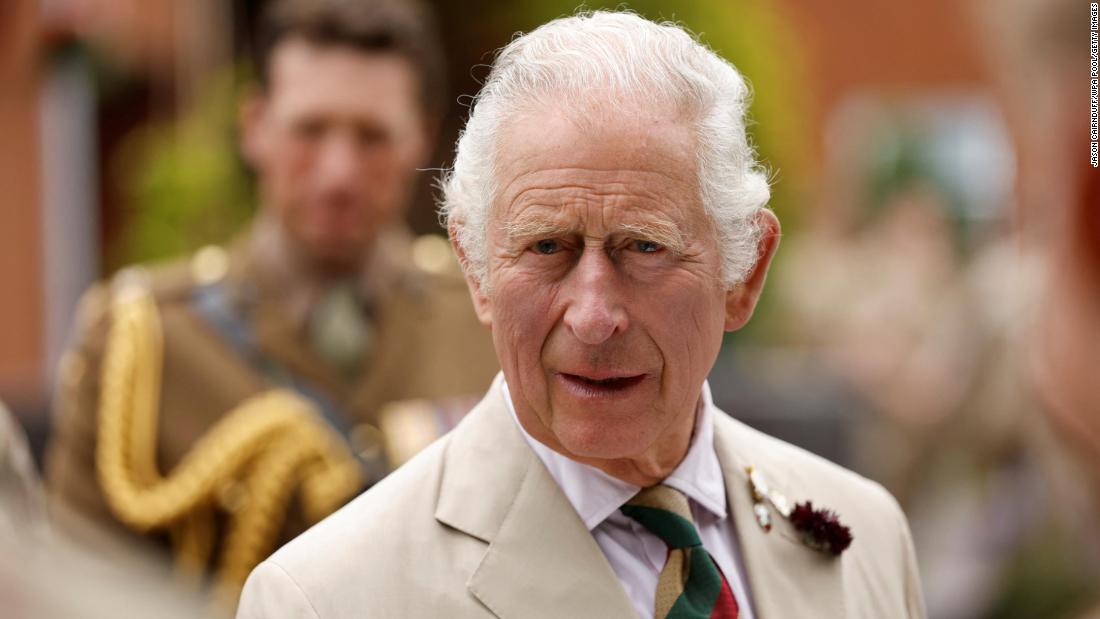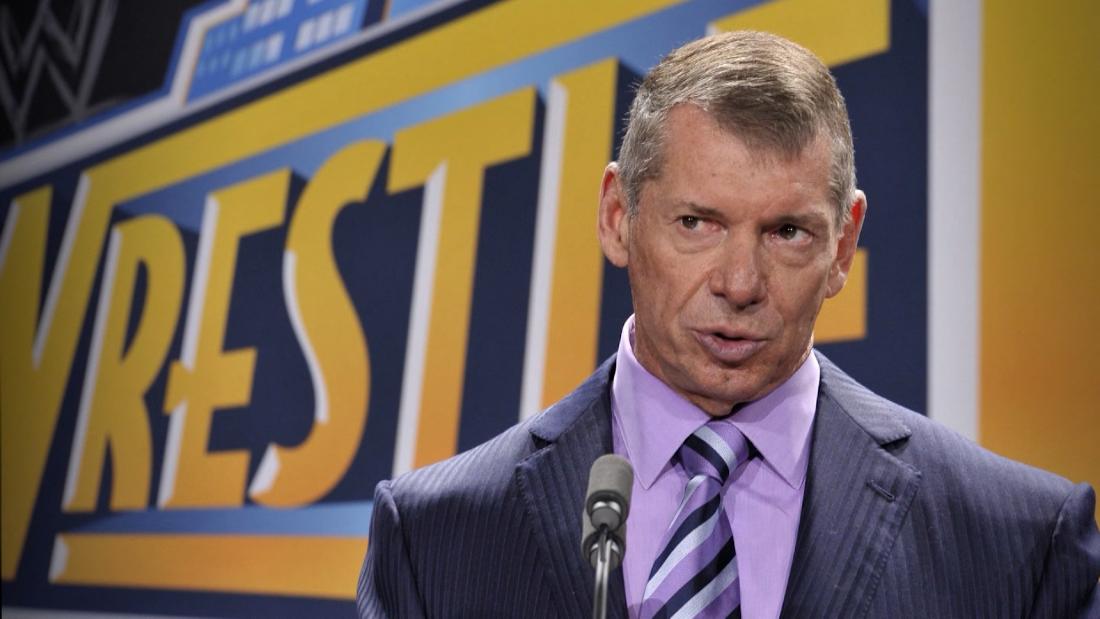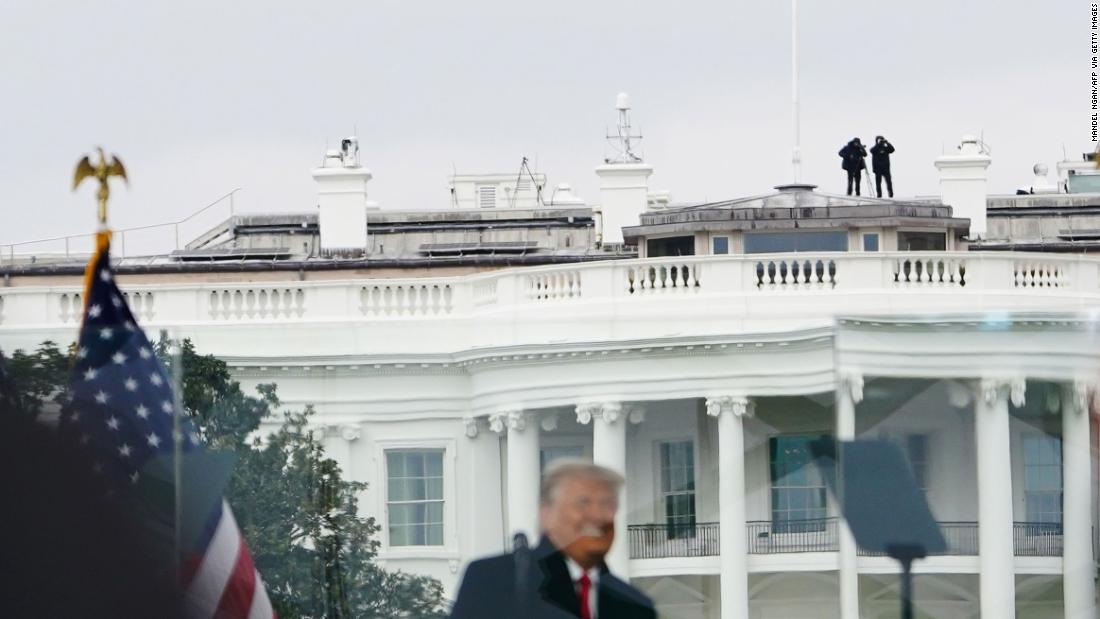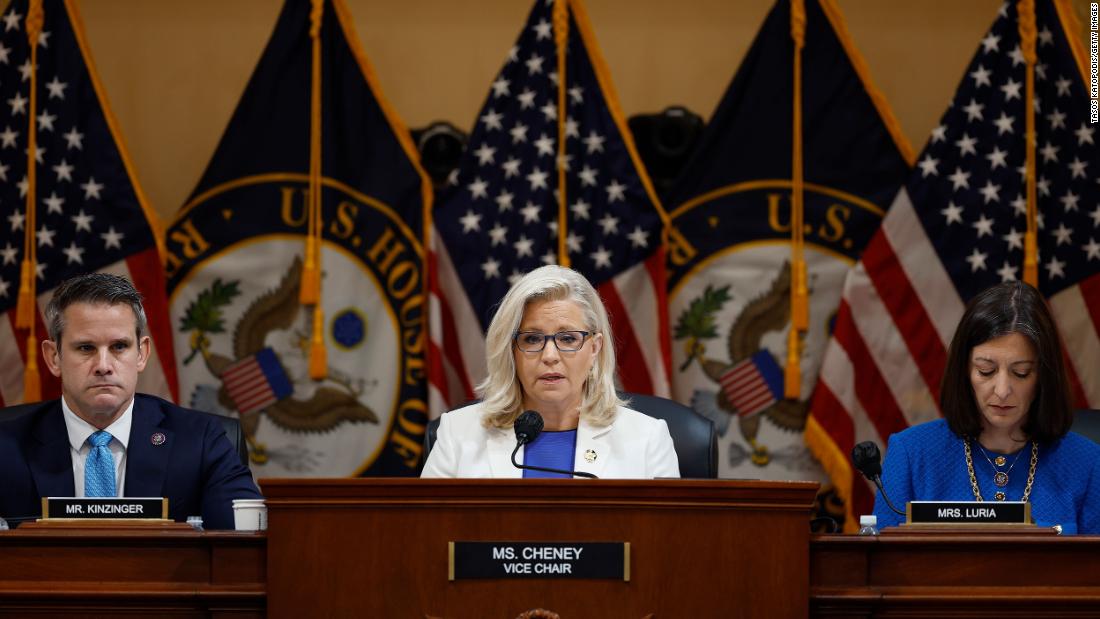Here are takeaways from Thursday's epic prime-time hearing.
The committee used Thursday's hearing to show how Trump not only failed to act, but chose not to as he watched the violent assault on the US Capitol unfold.
Several witnesses with first-hand knowledge of what was happening inside the White House on January 6 told the committee that Trump did not place a single call to any of his law enforcement or national security officials as the Capitol attack was unfolding, according to previously unseen video testimony played during Thursday's hearing.
The panel said it "confirmed in numerous interviews with senior law enforcement and military leaders, Vice President Mike Pence's staff, and DC government officials: None of them -- not one -- heard from President Trump that day," Luria said.
The committee used that testimony to make the case that Trump's refusal to intervene amounted to a dereliction of duty.
Former officials who were with Trump as he watched the riot unfold on television, including then-White House counsel
Pat Cipollone and Trump's body man Nick Luna, told the committee they had no knowledge of the former President making a single call to the heads of various agencies who could have responded to the violence, including the secretary of defense or attorney general.
Keith Kellogg, Pence's national security adviser who was also with Trump that day, testified that he never heard the former President ask for the National Guard or a law enforcement response.
Kellogg also reaffirmed that he would have been aware if Trump had made such an ask.
Matthews, the former White House spokeswoman, said she spoke with White House press secretary Kayleigh McEnany during the riot, and McEnany "looked directly at me, and in a hushed tone, shared with me that the President did not want to include any sort of mention of peace" in a tweet that they were crafting.
"To me, his refusal to act and call off the mob that day and his refusal to condemn the violence was indefensible," Matthews said at the hearing.
That testimony fit with other evidence presented on Thursday, like the outtakes of Trump's videotaped speech on January 7, where he tried to water down some of the prepared language and told his aides, "I don't want to say the election's over, OK?"
Chairman of the Joint Chiefs Gen. Mark Milley told the House select committee that he was astonished by the fact that he never heard from Trump as the Capitol attack was unfolding -- suggesting his failure to act amounted to an abdication of his duties as Commander in Chief, according to previously unseen video from his close-door deposition.
"You know, you're the Commander in Chief. You've got an assault going on on the Capitol of the United States of America and there's nothing? No call? Nothing? Zero?" he said in the clip.
"Were starting to fear for their own lives': Disturbing audio and video shows danger felt by Pence security detail
Thursday's hearing featured new and disturbing video and audio showing how endangered Pence's security detail felt he was as they tried to evacuate the vice president from the Capitol.
The committee painted the fullest picture to date of the danger facing Pence and his team as rioters called for hanging Pence when he refused to go along with Trump's efforts to try to overturn the 2020 election.
A committee witness testified that Pence's detail was so concerned with what was transpiring that they "were starting to fear for their own lives," and that there were calls "to say goodbye to family members."
The witness was a National Security Council official who worked in the White House on January 6, whose audio testimony was masked to shield the official's identity.
"Is the VP compromised? Like, I don't know. We didn't have visibility, but if they're screaming and saying things, like, say goodbye to family....this is going to a whole other level soon," the national security official said.
The House select committee also revealed, for the first time, Secret Service radio traffic as agents assessed the Senate stairwell where Pence would be evacuated, while rioters were confronting police in a hallway downstairs at the same time. The video played Thursday spliced together the surveillance tapes with the security footage and sound of Pence's detail, bringing into focus how near a miss Pence and his detail experienced.
Committee contrasts Pence's presidential actions with Trump's inaction
One focus of the select committee's hearing was the presidential actions that were taken on January 6, not by Trump but by Pence.
The committee emphasized how Trump did not try to call law enforcement or military officials on January 6, while Pence -- whose life was endangered by rioters -- "worked the phones" speaking to Milley and then-acting Defense Secretary Chris Miller.
The committee played video of Milley's deposition where he said he had "two or three calls" with Pence.
"He was very animated, and he issued very explicit, very direct, unambiguous orders. There was no question about that," Milley said. "He was very animated, very direct, very firm to Secretary Miller: Get the military down here, get the Guard down here, put down this situation."
Luria painted a direct contrast to what Trump did on January 6: "The President did not call the vice president or anyone in the military, federal law enforcement or DC government. Not a single person," she said.
The committee's comparison between Trump and Pence underscores how Trump is still angry with his vice president over January 6. Politically, Pence has gone against Trump in several primaries ahead of a possible 2024 presidential contest. The former vice president has endorsed Republicans who rejected Trump's false claims of fraud, including Georgia Gov. Brian Kemp -- who defeated a Trump-backed primary challenge -- and Arizona Republican Karrin Taylor Robson, who is running in the state's gubernatorial primary against a Republican who has embraced Trump's lies about the election.
The committee, which counts two anti-Trump Republicans as members -- Kinzinger and the committee's vice chairman, Rep. Liz Cheney of Wyoming -- has painted Pence as one of the key officials who stood up to Trump after he lost the 2020 election.
The committee also included in its hearing Thursday a clip of Joe Biden on January 6 condemning the violence -- in what was a subtle nod to Biden acting presidential before in comparison to Trump before he was inaugurated as president.
Committee goes after congressional Republicans (again)
The committee threw several sharp elbows at congressional Republicans during Thursday's hearing, taking on House Minority Leader Kevin McCarthy and other allies of Trump.
The committee played audio clips, which have been disclosed previously, where McCarthy spoke of his conversations with Trump after January 6 and said that he was considering advising him to resign.
The committee also played a video clip from the deposition of Trump son-in-law Jared Kushner in which Kushner said that McCarthy "was scared" amid the unfolding violence at the Capitol when the two spoke by phone on January 6.
In addition, the panel spotlighted Sen. Josh Hawley, the Missouri Republican who led the Senate's objection to the election results on January 6. The panel showed a well-known photo of Hawley raising his fist toward the rioters outside the Capitol the morning of January 6.
Immediately afterward, the panel played video showing Hawley running out of the Senate chamber -- and played it a second time in slow motion for emphasis. Later that night, Hawley forced debate on the Pennsylvania election results and voted against certifying them.
The panel's two Republicans, Kinzinger and Cheney, have been vocal critics of McCarthy as they've been ostracized from the House GOP conference. Both could be out of Congress next year: Kinzinger is retiring and Cheney is facing a Trump-backed primary challenger in Wyoming.
Kinzinger co-led Thursday's hearing.
The committee has previously gone after congressional Republicans for their role aiding Trump's efforts to overturn the election, including seeking pardons after January 6. And the committee's clashes with McCarthy run far beyond the hearings: The committee has subpoenaed five Republicans, including McCarthy, in an unprecedented move.
Committee adds corroboration of Hutchinson testimony
The January 6 committee on Thursday provided new evidence to back up the explosive testimony of former White House aide Cassidy Hutchinson, who publicly described Trump's angry interactions with his Secret Service detail after Trump was told he could not go to the Capitol.
Luria said the committee had information from two additional sources to partially corroborate Hutchinson's testimony that Trump lunged at his Secret Service detail. One of the witnesses, Luria said, "is a former White House employee with national security responsibilities."
While the individual was not named, Luria said that the official testified that Tony Ornato, then-Trump White House deputy chief of staff and a current member of the Secret Service, told him the same story that Hutchinson testified Ornato had told her -- that Trump was "irate" when Robert Engel, the Secret Service agent in charge on January 6, 2021, would not take him to the Capitol.
The second witness was retired Washington, DC, police Sgt. Mark Robinson, who was in Trump's motorcade that day. Robinson testified that the Secret Service agent responsible for the motorcade had said that Trump had a "heated" discussion with his detail about going to the Capitol.
Robinson added that he had been in "over 100" motorcades with Trump and had never heard of that type of exchange before January 6.
Hutchinson's testimony about Trump lunging at his Secret Service detail has become a key point that Trump's allies have tried to use to discredit the investigation.
While the detail about Trump lunging toward a Secret Service agent was just one snippet of Hutchinson's testimony, the pushback likely contributed to the committee's decision to add additional testimony backing up her account during Thursday's hearing. Luria noted that the committee expected to receive more testimony in the coming weeks about the interaction.
California Democratic Rep. Zoe Lofgren, a member of the committee, told CNN that Ornato and Engel have both retained private counsel to engage with the panel.
Never-before-seen videos, photos, audio bring 187 minutes to life
The hearing was peppered with never-before-seen videos, photos and audio that reanimated the horrors of January 6 and -- amazingly, 18 months later -- broke new ground about what happened that day. In this respect, the panel delivered on its promise to bring new material.
We saw previously undisclosed outtakes of video statements that Trump released on January 6 and 7, which showed Trump struggling to condemn the rioters. There was also the chilling audio of Pence's security detail, strategizing his evacuation from the Senate, which brought the vice president dangerously close to the rioters, some of whom wanted to kill him.
There was in-the-room footage and photos of congressional leaders on the phone with Miller. The bipartisan group, including then-Senate Majority Leader Mitch McConnell and House Speaker Nancy Pelosi, sought Miller's assurances that the National Guard would restore order so they could resume the Electoral College proceedings.
And lawmakers highlighted Capitol security footage that had never seen the light of day, until Thursday. This included footage of GOP Sen. Josh Hawley of Missouri running through the Capitol to get away from the rioters, which the committee contrasted with Hawley's very public support for overturning the election, and his infamous raised fist he gave to the crowd of rioters outside.
Taken together, these clips created a compelling multimedia experience, which the committee hopes will capture the public's attention and drive home their message. After all, the panel hired a prominent former TV executive to produce the hearings, and has worked aggressively with subpoenas and court battles to obtain mountains of new material. It's all now coming together.
Secret Service in the spotlight
Thursday's hearing came after
a whirlwind week for the US Secret Service. The Department of Homeland Security inspector general who conducts oversight of the agency
publicly accused the Secret Service of deleting text messages from January 5 and 6, 2021, which are critical to multiple inquiries about the insurrection. That inspector general probe is now a criminal investigation, CNN has reported.
(The Secret Service denies maliciously deleting anything, says any missing messages were lost during a routine phone replacement program, and says it is cooperating with all ongoing inquiries.)
As mentioned, the hearing featured testimony from an unnamed White House security official and a DC police sergeant who provided more context on the Secret Service's activities. And Luria said some Secret Service witnesses have recently lawyered up, and that the committee expects "further testimony under oath and other new information in the coming weeks."
Any additional cooperation from Secret Service officials could help the committee figure out what happened with the potentially missing text messages, which has emerged over the last few days as a key flashpoint in the investigation, with lawmakers increasingly upset at the agency.
Public hearings to resume in September
The committee will take a summer break in August and resume public hearings in September.
"Our committee will spend August pursuing emerging information on multiple fronts, before convening further hearings this September," Cheney said.
Lawmakers have said their investigation is ongoing. Earlier in the hearing, Rep. Bennie Thompson, the committee chairman, said "we continue to receive new information every day."
The panel has conducted eight public hearings so far, and has seen impressive TV ratings while presenting substantial amounts of damaging new information about Trump and January 6. The next wave of hearings in September will come during the final stretch of the midterm campaign.
Committee members have said they intend to issue an interim report around that time as well.
This story has been updated with additional developments Thursday.
CNN's Annie Grayer contributed to this report.













